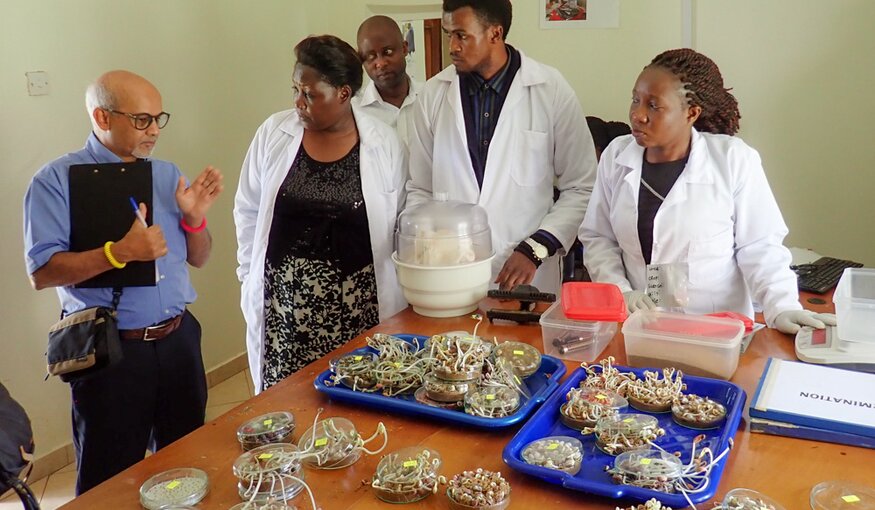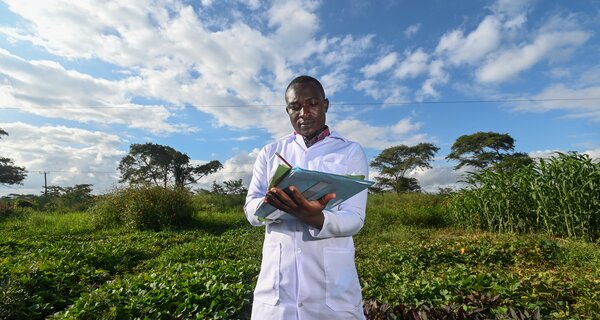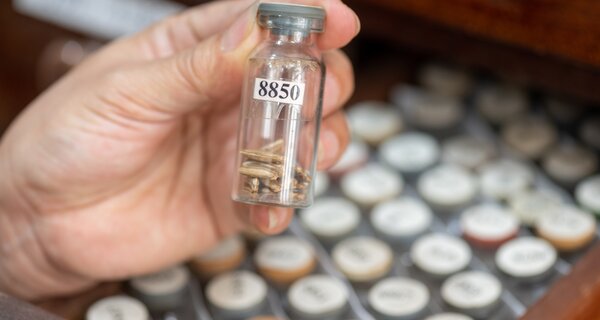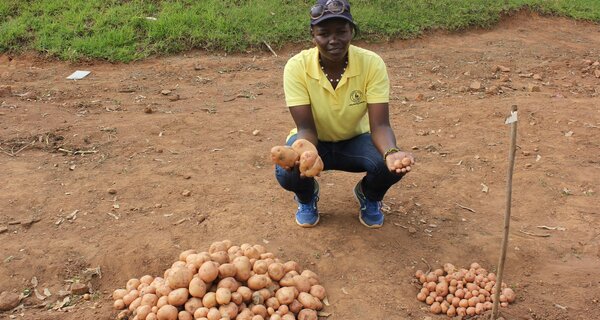Urgent Action Needed as Farmer Varieties Disappear from Use
 Ehsan Dulloo shares information during the review of the national genebank of Uganda. (Photo: Paul Neate for Crop Trust)
Ehsan Dulloo shares information during the review of the national genebank of Uganda. (Photo: Paul Neate for Crop Trust)7 February 2023
A team of genebank specialists recently reviewed national crop genebanks in Uganda and Tanzania as part of the Biodiversity for Opportunities, Livelihoods and Development (BOLD) Project.
Both Uganda and Tanzania are rich in agricultural biodiversity, including crops such as banana, coffee, cowpea, millets, sorghum and a wide range of indigenous vegetables, herbs and spices. But this diversity is at risk.
“We are losing crop diversity every day,” says John Wasswa Mulumba, curator and head of the Ugandan Plant Genetic Resources Centre, which is under the National Agricultural Research Organization (NARO). “Farmers’ varieties are dropping out of favour and out of sight as they are replaced with new varieties and even new crops.”
William Hamisy, head of the Plant Genetic Resources Centre of Tanzania, sounds a similar warning: “Farmers in Tanzania are losing a lot of traditional varieties as a result of agricultural modernization and climate change.”
This new reality underlines the importance of genebanks as custodians of this crop diversity – all of it, including the wild cousins of domesticated varieties - diversity that is needed to adapt agriculture to present and future challenges.
A review team of external experts recently toured the national genebanks of both countries to evaluate their progress and determine how the Biodiversity for Opportunities, Livelihoods and Development (BOLD) project can help them improve.
Focus on Seed Banking
The national genebanks in Uganda and Tanzania focus their efforts on crops with “orthodox” seeds that can be dried and stored at low temperatures. In Uganda, crops such as banana and cassava that have to be conserved in the field or kept in tissue culture in the lab under special conditions are not under the remit of the genebank. Separate NARO institutes deal with these crops and maintain their own collections of crop diversity. The Tanzania genebank has small collections of bananas, cassava and sweetpotato in field genebanks but recognizes that much more needs to be done to conserve these important crops.
Seed Handling and Processing Challenges in Both Genebanks
Both genebanks face challenges in the initial handling and processing of the seed entering the genebank.
“The conditions in Entebbe, Uganda, are particularly challenging,” said Paula Bramel, leader of the review team. “Ambient temperature and humidity are always high — 25°C or more during the day and 77% relative humidity throughout the year.”
Ideally, seed should be packed for long-term storage at 15°C and 15% relative humidity. But the Uganda genebank does not have seed processing rooms with temperature or humidity control. This means that the seed may be too warm and moist when sealed into aluminium foil packets before being put into the freezers. This can reduce how long the seed stays viable in storage.
The Tanzania genebank does have a drying room in which temperature and humidity can be controlled, but the system has broken down. “There is a big backlog of seeds that need drying,” said Theo van Hintum, head of the Centre for Genetic Resources, the Netherlands, and a member of the BOLD review team in Tanzania.
Challenges, But Not All Doom and Gloom
But it’s not all bad news.
The genebanks have committed, diverse staff, ranging from people with long experience to relative newcomers, providing opportunities to build stronger operations and introduce new ideas and approaches.
And both genebanks have strong links with the farming communities that they serve. Both are supporting community seedbanks, which help ensure that farmers have ready access to the germplasm conserved in the national collections.
“We have a program of on-farm conservation that works closely with farmers,” said Hamisy. “As part of this, we monitor gaps — if there used to be a variety that the farmers grew in the past but that isn’t available anymore, we take it from the genebank and reintroduce it in farmers’ fields. This helps bring the services of the genebank close to our ultimate customers.”
Recommendations Under Development
Based on the reviews’ findings, the external genebank experts are refining their recommendations for actions to help the genebanks fulfil their missions effectively and efficiently.
These recommendations include urgent efforts to ensure that both genebanks’ collections are backed up in at least one additional location and also at the Svalbard Global Seed Vault. Other recommendations in common include the need to clear the backlogs of seed samples needing to be regenerated — producing fresh seed to restore the viability of the samples in storage.
“By the end of 2022, we completed the reviews of all of the 15 genebanks we will be working with over the next several years,” said Nelissa Jamora, who is coordinating this aspect of the BOLD Project. “Then we can get to work helping bring all of these genebanks up to the international standards that we all aspire to.”
Tanzania
Uganda
Category: BOLD
About the BOLD Project
BOLD (Biodiversity for Opportunities, Livelihoods, and Development) is a major 10-year project to strengthen food and nutrition security worldwide by supporting the conservation and use of crop diversity. The project works with national genebanks, pre-breeding and seed system partners globally. Funded by the government of Norway, BOLD is led by the Crop Trust in partnership with the Norwegian University of Life Sciences and the International Plant Treaty.




